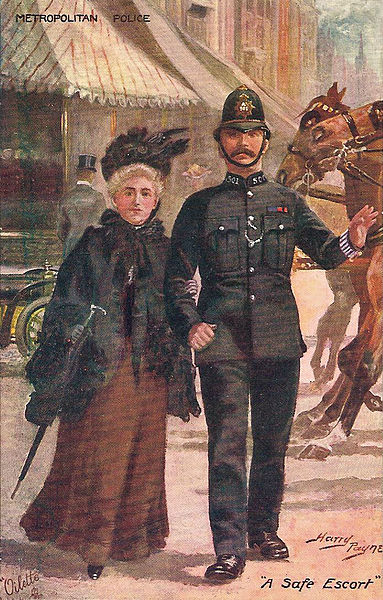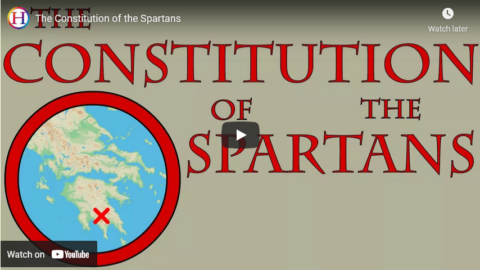Judges often ignore the law in order to deliver decisions that make them happy. I recall my Con. Law professor talking about this. He called it the “TTWILI” rationale: “That’s The Way I Like It.” A judge will look at the law, find that it directs a result he finds objectionable, and then come up with a way to defy the law. He’ll pretend to misinterpret it, or he’ll turn a blind eye to inconvenient facts, or whatever it takes. It happens every day. It’s the judicial equivalent of jury nullification. And like jury nullification, it is perfectly legal, and there isn’t a hell of a lot you can do about it once it’s done. Like my father says, “A federal judge is the closest thing to God you will ever see on this earth.”
Steve H. “About Injunctive Relief: Read Before You Criticize”, Hog On Ice, 2005-03-23.
August 19, 2021
QotD: Judges
July 18, 2021
A different kind of “tone policing”
John McWhorter on a recent study on interactions between the police and the general population:

“Police stop” by San Diego Shooter is licensed under CC BY-NC-ND 2.0
A fascinating, and depressing, new study will be celebrated as revealing the subtle but powerful operations of racism. It also reveals, however, the pitfalls in the way we are taught to address that racism these days.
The study shows that police officers tend to talk in a less friendly way to black people they stop than white ones. People were played slivers of body-cam audio of the officers talking to citizens, with the content of the exchange disguised. People could tell with dismaying regularity what color person the officer was speaking to simply by the tone of voice. It wasn’t that officers outright sneer at black people. Rather, their tone with whites tends to be more pleasant, to have a hint of cheer, whereas with black people it is more impersonal, flat, unwarm.
The study also shows how these things fashion a vicious cycle. People tested who had negative experiences with cops and/or less trust in them processed even the exchanges the cops had with white citizens as less positive than other people tested did. That is, their life experience has implanted in them a distrust of the cops, that can anticipate actual interactions with them – and certainly, of course, unintentionally pollute them.
* * *
This study reminds me of something else that goes in the other direction. To whites, subtle things about black communication, including vocal tone, can come off as threatening when no threat is intended.
I once happened to hear two 30-something black men talking about a misunderstanding one of them had had at work. They were just unwinding, but there was what many might process as a tinge of impending battle in their voices, inflections and gestures. “Man, I wanted to ‘Mmmph!’ [jab of the arm, click of the tongue] Gimme a break! An’ I was like … [putting on a challenging glare] don’t even start.”
No black listener would assume these guys actually meant the hints at violence literally. However, outside listeners can hear this way of talking as edgy. Kelefa Sanneh’s term for this twenty years ago, writing about rap and its lyrics, was perfect: a certain “confrontational cadence”.
Yes, all people trash-talk. But this particular way of talking has a special place in black American culture. No, that’s not stereotyping: sympathetic black academics have documented it. CUNY’s Arthur Spears, today one of the deans of the academic study of black American speech, has written about what he calls “directness”. Speech “that may appear to outsiders to be abusive or insulting is not necessarily intended to be nor is it taken that way by audiences and addressees,” Spears noted. He then quoted a father-child exchange: Father: “Go to bed!” Little boy: “Aw, Daddy, we’re playing dominoes.” Father: “I’m gonna domino your ass if you don’t go to bed now.” Notice how awkwardly this, or Eddie Murphy’s routine about the mother throwing the shoe in Delirious, would translate into the world of Modern Family.
This “confrontational cadence” can inflect even casual exchanges between black and white people. Aspects of black intonation, steeped in a lifetime’s experience in a language culture that values performative aggression as a kind of communal élan, can sound cranky, disrepectful, and even aggressive to a white person. It is all but impossible that this does not color encounters between black people and white cops; I highly suspect a study like the first one I mentioned would reveal it.
June 23, 2021
June 21, 2021
“The public are getting a little bit fed up of virtue-signalling police officers when they’d really rather we just locked up burglars”
Gawain Towler on the sudden, unexpected — and undoubtedly unwelcome to self-appointed guardians of the official narrative — appearance of what sounds surprisingly like common sense from a top police officer in Britain:

“A Safe Escort” by Harry Payne (1858-1927), first published in August 1911 but possibly painted a few years earlier. From the back of the card: “Among the hundred and one duties of the London Policeman he is here depicted as a kindly protector, halting the traffic as he escorts a Lady across the congested streets. This is essentially a London incident, and has no parallel in any other Police Force in the world.”
Photo of the Tuck’s Oilette by Leonard Bentley via Wikimedia Commons.
Has Robert Peel been reincarnated as the Chief Constable for Manchester?
“But officer, if you are not on your knee, and wearing a rainbow lanyard, how do we know that you are on the side of the oppressed, the intersectional, the poor, downtrodden graduates of minor universities?”
“I’m sorry madam, may I call you madam? I am on the side of the law.”
The promotion of Stephen Watson as the new Chief Constable for Manchester comes as a shaft of light cutting through the murk of muddled thinking. He has said two things that will resonate with millions and will cause consternation amongst thousands:
I would probably kneel before the Queen, God and Mrs Watson, that’s it … The public are getting a little bit fed up of virtue-signalling police officers when they’d really rather we just locked up burglars.
It sounds like the first blast of the trumpet, but not only does it strike an astonishingly different note than the honky tonk tunes played by other constabularies. Stentorian and self confident it also marks a huge departure in that he makes a very public statement that he would kneel before God. A very courageous statement in the current climate in itself. But it is his approach to policing that strikes the eye.
One almost feels that as was once the case, each new officer in the Manchester Metropolitan Area will be issued with Sir Robert Peel’s 1829 Nine Principles of Policing. It is worth our while looking at those principles and deciding whether or not to accept that they should remain at the core of policing, or be junked as impossibly dated.
What is clearly apparent is that Peel’s principles are at heart about consent. Famously it described the police as merely the citizens in uniform, or that “the police are the public and that the public are the police, the police being only members of the public who are paid to give full time attention to duties which are incumbent on every citizen in the interests of community welfare and existence”.
Underlying this basic thought is an understanding that the police rely, entirely on the goodwill of the populace, if they wish to carry out their basic duties. In order to fulfil their functions and duties they are “dependent on public approval of their existence, actions and behaviour and on their ability to secure and maintain public respect”.
June 20, 2021
Is racism a bigger problem than terrorism?
With Americans being urged to report on “radicalized” friends and family by the government and white supremacy being called the greatest threat, have we reached the point that being seen as racist is worse than allowing a terrorist to kill many people? The inquiry into the Manchester Arena bombing shows that’s exactly the state most of the western world is in:

“Manchester Arena Bomb (22 May 2017) – Daily Mirror – 19 dead in pop concert ‘suicide bomb'” by Bradford Timeline is licensed under CC BY-NC 2.0
The independent inquiry into the Manchester Arena bombing of May 2017, in which 22 pop fans were killed by an Islamist extremist, has published the first volume of its report. It makes for chilling reading. The inquiry has found there were numerous “missed opportunities” to confront Salman Abedi, the bomber, and potentially stop him from detonating the device in his rucksack. Most chilling of all is the reason given by one of the key security guards on patrol that evening as to why he failed to question Abedi. He was worried, he said, that asking a brown-skinned man why he was hanging around the arena might be construed as racist.
Take that in. There was a very shifty-looking young man around the foyer and mezzanine of the Manchester Arena towards the end of an Ariana Grande concert, carrying a “bulging” rucksack so large he “struggled” under the weight of it, and a security guard was reluctant to confront him lest he be accused of racism. In the words of the report, this was a significant “missed opportunity”. The “inadequacy” of the security guard’s response to the presence of a highly suspicious individual was one of the many misjudgements made on that black, fateful night, the report says. Is it possible that the fear of being thought of as racist is screwing up everyday life, and even hindering sensible action in threatening situations?
To be clear, the security guard who was cagey about questioning Abedi is not responsible for the failure to stop Abedi from detonating his device. The first volume of the inquiry’s report – which covers security at and around the arena on the night of 22 May 2017 – criticises certain individuals, including the security guard, for not doing their jobs diligently enough. But it says that it was the organisations responsible for security at the arena – the arena’s own security firm and also the British Transport Police – that were “principally” to blame for the “missed opportunities”. It also makes the reasonable point that it is impossible to know what would have happened if Abedi had been confronted. It proposes that there may still have been loss of life – if, for example, he had detonated his device while being questioned – but that it would have been less severe than the horrors that shortly unfolded.
It is disturbing to read the list of “missed opportunities”. Abedi was in the arena for more than an hour and a half before he detonated his bomb. He arrived at 20.51 and blew himself up at 22.31, as the concert attendees started to leave. In that time, this young man with a massive rucksack was seen by numerous people. He was described by some of them as “nervous” and “fidgety”. He looked out of place – his age “meant that he did not fit the demographic of a parent waiting for a child”, as the inquiry says. And yet as a result of individual and organisational failure – including, the inquiry says, insufficient training of the security guards on duty that night – the message didn’t get through that there was a fidgeting, agitated man with a bulging rucksack hanging around for 90 minutes at the exit area of a venue that was largely packed with children and teenagers.
Remarkably, some people at the arena who saw Abedi thought to themselves that he was a suicide bomber. Christopher Wild and his partner, Julie Whitley, who were picking up Whitley’s daughter, discussed the possibility that Abedi had a bomb in his rucksack. Wild actually did confront Abedi and asked him what was in his bag. Abedi nervously brushed him off. Wild reported his concerns to security guards at 22.15 – 16 minutes before the explosion – but he was “fobbed off”. Another parent said the security guards were “really quite dismissive” of Wild’s concerns. It is deeply disturbing that parents at the arena rightly suspected Abedi was a bomber and yet nothing was done to challenge or remove him.
June 19, 2021
Proposed new firearms rules “… are ultimately unenforceable, and […] they are dangerous end-runs around due process that threaten fundamental rights”
J.D. Tuccille reports on the latest US federal government proposals on changes to firearm regulations:
As expected, the Biden administration released proposed new rules for pistol braces and model legislation for “red flag” laws that make it easier to confiscate privately owned firearms. Also as expected, the proposals are ludicrous. On the one hand, they are pointless and nitpicky rules that are ultimately unenforceable, and on the other hand they are dangerous end-runs around due process that threaten fundamental rights. Taken together, they illustrate the unserious nature of gun regulations which are crafted more to appeal to political audiences than to achieve positive results.
The silliness inherent in this sort of rulemaking is apparent from the Department of Justice’s announcement of “a notice of proposed rulemaking that makes clear that when individuals use accessories to convert pistols into short-barreled rifles, they must comply with the heightened regulations on those dangerous and easily concealable weapons.”
For those new to this controversy, stabilizing braces were developed to help disabled veterans more accurately shoot pistols (usually those built around AR-15 receivers) one-handed. The “problem” is that many resemble shoulder stocks and can be used in that role. By no means does an attachment that lets a pistol be fired from the shoulder make it especially “dangerous and easily concealable.” Instead, it makes it less concealable since it has a brace sticking off the back. Braces do render pistols more accurate, which could be interpreted as dangerous if you’re upset by shooters hitting where they aim.
But a pistol that can be fired from the shoulder is arguably a short-barreled rifle under the National Firearms Act (NFA), and subject to special restrictions, taxes, and registration requirements that don’t apply to regular pistols or regular rifles, but do apply to (among other weapons) rifles with barrels shorter than 16 inches. These regulations are not evidence that short-barreled rifles are particularly dangerous, but that, like many laws, the NFA is thoroughly idiotic.
Braces have been treated as legal devices for years but have recently been targeted by the sort of people who see advantage in pretending that a firearm with a buttstock and a short barrel is more “dangerous and easily concealable” than stock-less pistols and long-barreled rifles. In compliance with White House direction, proposed rules from the Bureau of Alcohol, Tobacco, Firearms, and Explosives (ATF) would impose new requirements to determine if braced pistols achieve Great Pumpkin-level sincerity, or are super-dangerous and concealable short-barreled rifles in disguise.
Among other tests, the rule would set the maximum length of a pistol at 26 inches (because 27 inches is super-dangerous and concealable). These tests add up to a four-point assessment, ranging from “1 point: Minor Indicator (the weapon could be fired from the shoulder)” to “4 points: Decisive Indicator (the weapon is designed and intended to be fired from the shoulder)” with four points the ultimate sign that a firearm crosses the line into very naughty territory indeed.
[…]
But foolish stabilizer brace rules affect mostly disabled shooters and fanciers of a particular type of firearm. Red flag laws affect potentially any gun owner by allowing for property seizures and confrontations with law enforcement without due process.
Red flag laws “make it easier for states to craft ‘extreme risk protection orders’ authorizing courts to temporarily bar people in crisis from accessing firearms,” insists the Department of Justice. “By allowing family members or law enforcement to intervene and to petition for these orders before warning signs turn into tragedy, ‘extreme risk protection orders’ can save lives.”
Maybe such orders “can save lives”—all sorts of restrictions on personal liberty theoretically “can save lives” if that’s your only criteria. But the model legislation proposed by the Biden administration requires same-day issuance of orders that “prohibit the respondent from possessing, using, purchasing, manufacturing, or otherwise receiving a firearm” with a hearing to be held only after the fact. That certainly deprives those affected of their rights without due process of any sort before cops show up on their doorsteps to search the premises and confiscate property.
June 9, 2021
June 8, 2021
QotD: Magna Carta
There also happened in this reign the memorable Charta, known as Magna Charter on account of the Latin Magna (great) and Charter (a Charter); this was the first of the famous Chartas and Gartas of the Realm and was invented by the Barons on a desert island in the Thames called Ganymede. By congregating there, armed to the teeth, the Barons compelled John to sign the Magna Charter, which said:
- That no one was to be put to death, save for some reason (except the Common People).
- That everyone should be free (except the Common People).
- That everything should be of the same weight and measure throughout the Realm (except the Common People).
- That the Courts should be stationary, instead of following a very tiresome medieval official known as the King’s Person all over the country.
- That “no person should be fined to his utter ruin” (except the King’s Person).
- That the Barons should not be tried except by a special jury of other Barons who would understand.
Magna Charter was therefore the chief cause of Democracy in England, and thus a Good Thing for everyone (except the Common People).
After this King John hadn’t a leg to stand on and was therefore known as `John Lackshanks’.
W.C. Sellar & R.J. Yeatman, 1066 And All That, 1930.
May 21, 2021
QotD: Avoid situations that can “escalate fast”
… we don’t know what sort of history these neighbors had leading up to this. Still, it’s a good example of why it’s a good idea to not just start cussing people in public.
Also, this is an answer to the question “You mean you carry a gun when you’re just doing yard work or shoveling snow?” Oh hell yes I do.
Also also, this is why I generally try and avoid getting involved in anyone else’s crazy day.
If someone’s acting up in public, I can apologize and disengage from the situation. If I really feel the need to, I can go complain about them on social media in private later and nobody’s gonna pop off and trigger a gunfight if I do.
If you carry a gun, any altercation can escalate into a gunfight. Deescalate. Avoid altercations.
Lastly, there is a problem experienced by people who haven’t been exposed to interpersonal violence of any type; they have no experience in reading the differences between bluffing and the real deal. It’s why you see these “You ain’t gonna shoot me!” situations.
People waving a gun just to let you know they have a gun is a very real phenomenon and doesn’t necessarily mean violence is imminent; they’re just letting you know that certain off-ramps from the situation are closed. Okay, you have a gun and I need to stop pushing. Cool, cool.
This guy? He was not that guy.
People say “You wouldn’t…” to people who are practically lighting off signal rockets to tell you that oh, yes the fuck they would and are, in fact, fixin’ to.
Tamara Keel, “Finding Out”, View From the Porch, 2021-02-05.
May 20, 2021
The Birth Control Movement and Eugenics – A Curious Link | B2W: ZEITGEIST! I E.18 – Winter 1923
TimeGhost History
Published 19 May 2021In the winter of 1923, a controversial activist takes a Catholic doctor to trial for libel. The proceedings capture a much bigger moment in the history of the interwar period: the controversial — but inherent — link between birth control and eugenics.
(more…)
May 19, 2021
The ginger Windsor loose cannon on “bonkers” free speech protection in the United States
James Delingpole on the latest unfortunate burble from one of the much lesser members of the House of Windsor:

Prince Harry and Meghan Markle visit Titanic Belfast in March 2018.
Photo from the Northern Ireland Office via Wikimedia Commons.
Prince Harry’s epic stupidity is probably inherited from his presumed father, the Prince of Wales. Prince Charles, too, only got two A levels — a B in History and a C in French — yet somehow strings were pulled to land him a place at Cambridge University (normally it would have required something like three A grades at A Level, plus a decent performance in the entrance exam), where he scraped a lowly 2:2 in History.
There is, of course, nothing wrong with being epically, fabulously, unbelievably stupid. Many upper-class men successfully make their brainlessness part of their comical charm. Where stupidity becomes unattractive and culpable, though, is when it’s deployed to comment on issues far, far above its pay grade, and when it’s afforded undeserved prestige.
No one as thick as Harry, it’s surely a given, ought ever be allowed on to a public platform to pronounce on issues as vital as the protection of free speech. Yet this is exactly what happened when Harry was given space to expound his half-baked views on a podcast. Sure, Harry had the good grace to admit that he hadn’t a clue what he was talking about:
I don’t want to start going down the First Amendment route because that’s a huge subject and one which I don’t understand because I’ve only been here a short time.
Unfortunately, that didn’t stop him declaring that he thought the First Amendment was “bonkers”.
His explanation as to why he thought so was a bit incoherent, but it seemed to involve his belief that it could be used for something bad called “ideology” and could be used as an excuse to “spread hate”. He added: “Laws were created to protect people.” What I’m guessing Harry was struggling to do was to try to wheel out the woke cliche that while free speech is fine, “hate speech” isn’t fine and should not enjoy constitutional protection. This threadbare argument can be demolished in a second by anyone with more than two A Levels. Essentially if “free speech” laws don’t protect “hate speech” then they are not really free speech protection laws at all.
Like Prince Harry, I wouldn’t consider myself to be an expert on U.S. history. But I do dimly recall that round about the second half of the 18th century America’s colonists successfully freed themselves from rule by one of Prince Harry’s ancestors. The U.S. Constitution — and that pesky First Amendment — was one of the consequences.
May 5, 2021
April 22, 2021
Al Capone, Prohibition, and the American Dream | B2W: ZEITGEIST! I E.16 – Summer 1922
TimeGhost History
Published 21 Apr 2021The Prohibition era is still just getting started, but criminal enterprises have already sprung up everywhere to supply thirsty Americans with their drink. In the “summer of sin” of 1922, one man in particular is making waves in the Chicago underworld.
Join us on Patreon: https://www.patreon.com/TimeGhostHistory
Hosted by: Indy Neidell
Written by: Francis van Berkel
Director: Astrid Deinhard
Producers: Astrid Deinhard and Spartacus Olsson
Executive Producers: Astrid Deinhard, Indy Neidell, Spartacus Olsson, Bodo Rittenauer
Creative Producer: Maria Kyhle
Post-Production Director: Wieke Kapteijns
Research by: Francis van Berkel and Lewis Braithwaite
Image Research by: Daniel Weiss
Edited by: Daniel Weiss
Sound design: Marek KamińskiColorizations:
Daniel Weiss – https://www.facebook.com/TheYankeeCol…Sources:
Library of CongressSoundtracks from Epidemic Sound
– “One More for the Road” – Golden Age Radio
– “London” – Howard Harper-Barnes
– “Infinity Pool & Pool Tables” – Mythical Score Society
– “Rush of Blood” – Reynard Seidel
– “It’s Not a Game” – Philip Ayers
– “Please Hear Me Out STEMS INSTRUMENTS” – Philip Ayers
– “Not Safe Yet” – Gunnar Johnsen
– “On the Edge of Change” – Brightarm Orchestra
– “British Royalty” – Trailer Worx
– “Break Free” – Fabien Tell
– “Steps in Time” – Golden Age Radio
– “Magnificent March 3” – Johannes BornlöfArchive by Screenocean/Reuters https://www.screenocean.com.
A TimeGhost chronological documentary produced by OnLion Entertainment GmbH.
From the comments:
TimeGhost History
3 days ago
As you hopefully realized from the title, thumbnail, description, and first words coming out of Indy’s mouth, a big focus of this episode is the beginning of the gangland Prohibition era and the rise of Al Capone.It’s a fascinating topic, but something else to draw attention to in this episode is the Catholic Church’s campaign against modernity. Last episode we saw how religion was forced into retreat by the Bolshevik regime in Russia, well this episode we’re seeing one of the oldest religious institutions in the world make its fightback. It shows that the story of modernity isn’t just “old things” fading away and being replaced by “new things”. Instead, it is a story of continual tension, negotiation, and adaption, between the old and the new.
Anyway, philosophical musings on religion aside, this really is an exciting episode and there will be much more on Al Capone and the Beer War in years to come.
April 21, 2021
QotD: Freedom of speech in Canada
We have nothing like the First Amendment; our Supreme Court is a Leftist institution par excellence and has even decreed in effect that truth is no defense in cases where “protected groups” are insulted or offended. Paragraph 140 of a 2013 Judgment finds “that not all truthful statements must be free from restriction. Truthful statements can be interlaced with harmful ones or otherwise presented in a manner that would meet the definition of hate speech.” Section 15 (2) of the Constitution Act of 1982 abridges the rights that section 15(1) guarantees Canadian citizens.
Further, our Human Rights Tribunals are Soviet-style shadow courts that discard due process in adjudicating cases of supposed discrimination or “hate speech.” As Canadian Human Rights Commissioner Dean Steacy said: “Freedom of speech is an American concept, so I don’t give it any value.” Openness to everything except freedom of speech, chartered principle and practical reason is the hallmark of our justice system, as it is of the nation. As Carl Sagan quipped in The Demon-Haunted World: “It pays to keep an open mind, but not so open your brains fall out.”
David Solway, “The Canadian Mind: A Culture So Open, Its ‘Brains Fall Out'”, PJ Media, 2018-10-10.
April 12, 2021
The Constitution of the Spartans
Historia Civilis
Published 11 Sep 2017Patreon | http://historiacivilis.com/patreon
Donate | http://historiacivilis.com/donate
Merch | http://historiacivilis.com/merch
Mailing List | http://historiacivilis.com/mailinglist
Twitter | http://historiacivilis.com/twitter
Website | http://historiacivilis.comSources:
The Constitution of the Spartans, by Xenophon: http://amzn.to/2j7JXTB
The Moralia, by Plutarch: http://amzn.to/2gNMYHU
Parallel Lives: The Life of Lycurgus, by Plutarch: http://amzn.to/2xS29nI
Politics, by Aristotle: http://amzn.to/2wMq5ss
Rhetoric, by Aristotle: http://amzn.to/2xS3niO
Laws, by Plato: http://amzn.to/2wLpsiN
On the Republic, by Cicero: http://amzn.to/2j7Flgg
The Histories, by Herodotus: http://amzn.to/2xdH4a7
The Spartan Regime, by Paul A. Rahe: http://amzn.to/2vPmRqS
Property and Wealth in Classical Sparta, by Stephen Hodkinson: http://amzn.to/2xdV7MS
The Rise of Athens, by Anthony Everitt: http://amzn.to/2j69uMS
Persian Fire, by Tom Holland: http://amzn.to/2vPyCxEWe are a participant in the Amazon Services LLC Associates Program, an affiliate advertising program designed to provide a means for us to earn fees by linking to Amazon.com and affiliated sites.
Music:
“Air Hockey Saloon,” by Chris Zabriskie
“Candlepower,” by Chris Zabriskie
“CGI Snake,” by Chris Zabriskie
“Heliograph,” by Chris Zabriskie
“Hallon,” by Christian Bjoerklund
From the comments:
Temporary Fakename
3 years ago
You know, i thought the Roman political system was pretty odd and arcane. But the Spartans have a dual monarchy that has absolute power, except when it doesn’t, an elected Senate that is chosen partially randomly that can pass whatever the hell they want with a public assembly and punish kings, except when an all-male aristocracy decided no, a female aristocracy that is overwhelmingly rich but can’t vote, and a population so terrified of its own slaves that it ritually committed atrocities against them. Compared to that Roman politics look simple and elegant.
I found the presentation quite interesting and informative, but I felt that some discussion of the differences between the terrible plight of the Helots and the not-quite-free status of the Perioikoi was merited. I also felt that the final segment on the eventual decline of Sparta missed a major factor — Spartan military defeats in the Battle of Leuctra in 371 BC and the Battle of Mantinea in 362 BC — but reading down in the comments, I saw someone else had already brought this up:
xelena
2 years ago (edited)
This is a good video, but is missing a super important point at the end: The cause for the decline of Spartan power was its defeat by Epaminondas of Thebes and his freeing of Messenia (the land of the Helots). He also founded Messene in Messenia and Megalopolis in Arcadia for the Helots, which became a powerful check to Sparta. Spartan power never recovered from this death blow to its slave economy and continued to wither away into the nothingness you describe.Epaminondas is mostly forgotten today, but he was one of the greatest men of antiquity. It was him and Pelopidas who put to bed the myth of Spartan invincibility and freed an entire people who had been enslaved for centuries. So in a way, the crippling blow did come from other Greeks, and the Helots did participate in it.








